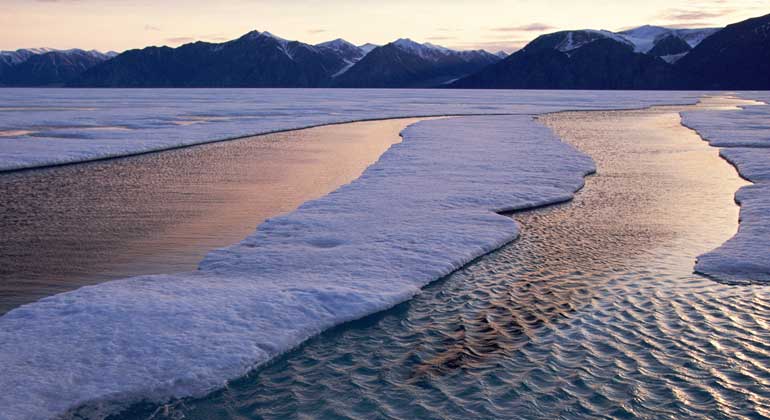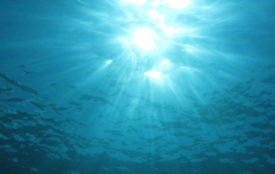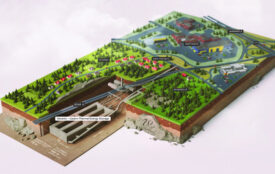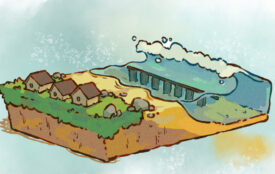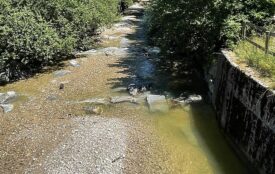Delays in renewable-energy deployment will prove costly to Arctic communities
Greater than expected cost benefits can be achieved through renewable-energy deployment in select Arctic communities, with savings for Iqaluit of almost $30 million over a 20-year period, research commissioned by WWF-Canada has found.
The study, performed by the Waterloo Institute for Sustainable Energy (a leading clean-energy research institute), revealed that deployment of a mix of renewable energy can lead to immense reductions in carbon dioxide emissions and millions in savings for communities already identified as having a good business case for renewable-energy deployment.

© wwf.ca
About the study:
● WISE developed a customized mathematical model for each of the identified communities – using community-specific data and timelines, as well as different types of technology – to provide realistic simulations over a 20-year period.
● In general, wind is the preferable renewable-energy option in Nunavut, though in the communities of Iqaluit, Arviat and Sanikiluaq, the diesel-solar-wind-battery combination was found to be the most cost-effective.
● The five communities included in this Arctic renewable-energy feasibility study were identified in a Phase I pre-feasibility study by WISE, also commissioned by WWF-Canada. (The Phase II study also looks at renewable-energy potential in Sachs Harbour, N.W.T.)
David Miller, president and CEO of WWF-Canada, says:
“In the United States-Canada Joint Arctic Leaders’ Statement, the government of Canada committed to reducing the reliance of Northern communities on diesel by deploying renewable power. If the greenhouse-gas emission reductions aren’t persuasive enough, the economic benefits to be found in switching to hybridized renewable-energy electricity generation are too significant to ignore. We know renewable-energy technology is already being relied on to supply the electrical needs of homes and businesses in Arctic communities in Alaska and Siberia. We know it leads to massive savings for governments, and we know it’s better for the environment. What communities need now is funding to support rapid renewable-energy deployment.”
Paul Crowley, WWF-Canada vice-president of Arctic conservation, says:
“The diesel generators in use in these communities are either at or past their useful life. Community leaders and the government of Nunavut will be forced to make decisions on replacing infrastructure sooner rather than later. Inuit leaders who attended our Arctic Renewable Energy Summit in Iqaluit in September made it clear they are eager to adopt clean and reliable energy sources that give them independence from fuel shipped from the the south and resiliency in the face of a rapidly changing climate. It’s time to accelerate the implementation of proven technologies to benefit Northern communities and the Arctic environment.”
Claudio Canizares, professor and principal investigator of WISE, says:
“Inevitably, questions arise about the reliability of hybridized electricity systems, particularly in emergency situations: What if a diesel generator fails? What if the wind doesn’t blow? What if it’s too cold or too windy? Many deployments of these systems in the Canadian North and particularly in Alaska have shown that hybrid systems are as reliable or even more reliable than existing diesel-based systems. In fact, the simulation models we developed – which take days to run for each community and have been validated with existing models and tools – take into account worst-case scenarios, and thus we feel very confident that our studies show that Arctic communities can technically and economically depend on renewable energy.”
About World Wildlife Fund Canada
WWF-Canada creates solutions to the environmental challenges that matter most for Canadians. We work in places that are unique and ecologically important, so that nature, wildlife and people thrive together. Because we are all wildlife.
● WISE developed a customized mathematical model for each of the identified communities – using community-specific data and timelines, as well as different types of technology – to provide realistic simulations over a 20-year period.
● In general, wind is the preferable renewable-energy option in Nunavut, though in the communities of Iqaluit, Arviat and Sanikiluaq, the diesel-solar-wind-battery combination was found to be the most cost-effective.
● The five communities included in this Arctic renewable-energy feasibility study were identified in a Phase I pre-feasibility study by WISE, also commissioned by WWF-Canada. (The Phase II study also looks at renewable-energy potential in Sachs Harbour, N.W.T.)
David Miller, president and CEO of WWF-Canada, says:
“In the United States-Canada Joint Arctic Leaders’ Statement, the government of Canada committed to reducing the reliance of Northern communities on diesel by deploying renewable power. If the greenhouse-gas emission reductions aren’t persuasive enough, the economic benefits to be found in switching to hybridized renewable-energy electricity generation are too significant to ignore. We know renewable-energy technology is already being relied on to supply the electrical needs of homes and businesses in Arctic communities in Alaska and Siberia. We know it leads to massive savings for governments, and we know it’s better for the environment. What communities need now is funding to support rapid renewable-energy deployment.”
Paul Crowley, WWF-Canada vice-president of Arctic conservation, says:
“The diesel generators in use in these communities are either at or past their useful life. Community leaders and the government of Nunavut will be forced to make decisions on replacing infrastructure sooner rather than later. Inuit leaders who attended our Arctic Renewable Energy Summit in Iqaluit in September made it clear they are eager to adopt clean and reliable energy sources that give them independence from fuel shipped from the the south and resiliency in the face of a rapidly changing climate. It’s time to accelerate the implementation of proven technologies to benefit Northern communities and the Arctic environment.”
Claudio Canizares, professor and principal investigator of WISE, says:
“Inevitably, questions arise about the reliability of hybridized electricity systems, particularly in emergency situations: What if a diesel generator fails? What if the wind doesn’t blow? What if it’s too cold or too windy? Many deployments of these systems in the Canadian North and particularly in Alaska have shown that hybrid systems are as reliable or even more reliable than existing diesel-based systems. In fact, the simulation models we developed – which take days to run for each community and have been validated with existing models and tools – take into account worst-case scenarios, and thus we feel very confident that our studies show that Arctic communities can technically and economically depend on renewable energy.”
About World Wildlife Fund Canada
WWF-Canada creates solutions to the environmental challenges that matter most for Canadians. We work in places that are unique and ecologically important, so that nature, wildlife and people thrive together. Because we are all wildlife.
